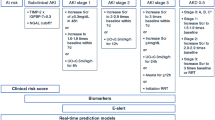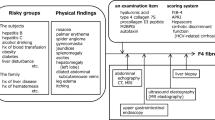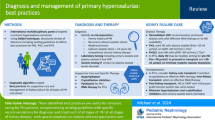Abstract
Nephrotoxin exposure accounts for up to one-fourth of acute kidney injury episodes in hospitalized patients, and the associated consequences are as severe as acute kidney injury due to other etiologies. As the use of nephrotoxic agents represents one of the few modifiable risk factors for acute kidney injury, clinicians must be able to identify patients at high risk for drug-induced kidney injury rapidly. Recently, significant advancements have been made in the field of biomarker utilization for the prediction and detection of acute kidney injury. Such biomarkers may have a role both for detection of drug-induced kidney disease and implementation of preventative and therapeutic strategies designed to mitigate injury. In this article, basic principles of renal biomarker use in practice are summarized, and the existing evidence for six markers specifically used to detect drug-induced kidney injury are outlined, including liver-type fatty acid binding protein, neutrophil gelatinase-associated lipocalin, tissue inhibitor of metalloproteinase-2 times insulin-like growth factor-binding protein 7 ([TIMP-2]·[IGFBP7]), kidney injury molecule-1 and N-acetyl-β-d-glucosaminidase. The results of the literature search for these six kidney damage biomarkers identified 29 unique articles with none detected for liver-type fatty acid binding protein and [TIMP-2]·[IGFBP7]. For three biomarkers, kidney injury molecule-1, neutrophil gelatinase-associated lipocalin and N-acetyl-β-d-glucosaminidase, the majority of the studies suggest utility in clinical practice. While many questions need to be answered to clearly articulate the use of biomarkers to predict drug-induced kidney disease, current data are promising.

(Adapted from the 10th Acute Dialysis Quality Initiative [ADQI] Consensus Conference; adqi.org) [13]


Similar content being viewed by others
References
Chertow GM, Burdick E, Honour M, Bonventre JV, Bates DW. Acute kidney injury, mortality, length of stay, and costs in hospitalized patients. J Am Soc Nephrol. 2005;16(11):3365–70.
Kerr M, Bedford M, Matthews B, O’Donoghue D. The economic impact of acute kidney injury in England. Nephrol Dial Transplant. 2014;29(7):1362–8.
Nisula S, Kaukonen KM, Vaara ST, Korhonen AM, Poukkanen M, Karlsson S, et al. Incidence, risk factors and 90-day mortality of patients with acute kidney injury in Finnish intensive care units: the FINNAKI study. Intensive Care Med. 2013;39(3):420–8.
Hoste EA, Bagshaw SM, Bellomo R, Cely CM, Colman R, Cruz DN, et al. Epidemiology of acute kidney injury in critically ill patients: the multinational AKI-EPI study. Intensive Care Med. 2015;41(8):1411–23.
Dasta JF, Kane-Gill SL, Durtschi AJ, Pathak DS, Kellum JA. Costs and outcomes of acute kidney injury (AKI) following cardiac surgery. Nephrol Dial Transplant. 2008;23(6):1970–4.
Mehta RL, Pascual MT, Soroko S, Savage BR, Himmelfarb J, Ikizler TA, et al. Spectrum of acute renal failure in the intensive care unit: the PICARD experience. Kidney Int. 2004;66(4):1613–21.
Mehta RL, Awdishu L, Davenport A, Murray PT, Macedo E, Cerda J, et al. Phenotype standardization for drug-induced kidney disease. Kidney Int. 2015;88(2):226–34.
Goldstein SL, Chawla LS. Renal angina. Clin J Am Soc Nephrol. 2010;5(5):943–9.
McCullough PA, Bouchard J, Waikar SS, Siew ED, Endre ZH, Goldstein SL, et al. Implementation of novel biomarkers in the diagnosis, prognosis, and management of acute kidney injury: executive summary from the tenth consensus conference of the Acute Dialysis Quality Initiative (ADQI). Contrib Nephrol. 2013;182:5–12.
Kane-Gill SL, Goldstein SL. Drug-induced acute kidney injury: a focus on risk assessment for prevention. Crit Care Clin. 2015;31(4):675–84.
Rivosecchi RM, Kellum JA, Dasta JF, Armahizer MJ, Bolesta S, Buckley MS, et al. Drug class combination-associated acute kidney injury. Ann Pharmacother. 2016;50(11):953–72.
Kellum JA, Lameire N, Group KAGW. Diagnosis, evaluation, and management of acute kidney injury: a KDIGO summary (part 1). Crit Care. 2013;17(1):204.
Murray PT, Mehta RL, Shaw A, Ronco C, Endre Z, Kellum JA, et al. Potential use of biomarkers in acute kidney injury: report and summary of recommendations from the 10th Acute Dialysis Quality Initiative consensus conference. Kidney Int. 2014;85(3):513–21.
Haase M, Kellum JA, Ronco C. Subclinical AKI—an emerging syndrome with important consequences. Nat Rev Nephrol. 2012;8(12):735–9.
Fuchs TC, Hewitt P. Biomarkers for drug-induced renal damage and nephrotoxicity—an overview for applied toxicology. AAPS J. 2011;13(4):615–31.
Cockcroft DW, Gault MH. Prediction of creatinine clearance from serum creatinine. Nephron. 1976;16(1):31–41.
Inker LA, Schmid CH, Tighiouart H, Eckfeldt JH, Feldman HI, Greene T, et al. Estimating glomerular filtration rate from serum creatinine and cystatin C [Erratum appears in N Engl J Med. 2012 Aug 16;367(7):681]. N Engl J Med. 2012;367(1):20–9.
Lameire N, Van Biesen W, Vanholder R. Acute renal problems in the critically ill cancer patient. Curr Opin Crit Care. 2008;14(6):635–46.
Doi K, Yuen PS, Eisner C, Hu X, Leelahavanichkul A, Schnermann J, et al. Reduced production of creatinine limits its use as marker of kidney injury in sepsis. J Am Soc Nephrol. 2009;20(6):1217–21.
Salazar DE, Corcoran GB. Predicting creatinine clearance and renal drug clearance in obese patients from estimated fat-free body mass. Am J Med. 1988;84(6):1053–60.
Sherman DS, Fish DN, Teitelbaum I. Assessing renal function in cirrhotic patients: problems and pitfalls. Am J Kidney Dis. 2003;41(2):269–78.
Cocchetto DM, Tschanz C, Bjornsson TD. Decreased rate of creatinine production in patients with hepatic disease: implications for estimation of creatinine clearance. Ther Drug Monit. 1983;5(2):161–8.
Rule AD, Bailey KR, Schwartz GL, Khosla S, Lieske JC, Melton LJ 3rd. For estimating creatinine clearance measuring muscle mass gives better results than those based on demographics. Kidney Int. 2009;75(10):1071–8.
Bouchard J, Macedo E, Soroko S, Chertow GM, Himmelfarb J, Ikizler TA, et al. Comparison of methods for estimating glomerular filtration rate in critically ill patients with acute kidney injury. Nephrol Dial Transplant. 2010;25(1):102–7.
Waikar SS, Bonventre JV. Creatinine kinetics and the definition of acute kidney injury. J Am Soc Nephrol. 2009;20(3):672–9.
Chiou WL, Hsu FH. Pharmacokinetics of creatinine in man and its implications in the monitoring of renal function and in dosage regimen modifications in patients with renal insufficiency. J Clin Pharmacol. 1975;15(5–6):427–34.
Shlipak MG, Matsushita K, Arnlov J, Inker LA, Katz R, Polkinghorne KR, et al. Cystatin C versus creatinine in determining risk based on kidney function. N Engl J Med. 2013;369(10):932–43.
Frazee EN, Personett HA, Wood-Wentz CM, Herasevich V, Lieske JC, Kashani KB. Overestimation of glomerular filtration rate among critically ill adults with hospital-acquired oligoanuric acute kidney injury. J Pharm Pract. 2016;29(2):125–31.
Leedahl DD, Frazee EN, Schramm GE, Dierkhising RA, Bergstralh EJ, Chawla LS, et al. Derivation of urine output thresholds that identify a very high risk of AKI in patients with septic shock. Clin J Am Soc Nephrol. 2014;9(7):1168–74.
Prowle JR, Liu YL, Licari E, Bagshaw SM, Egi M, Haase M, et al. Oliguria as predictive biomarker of acute kidney injury in critically ill patients. Crit Care. 2011;15(4):R172.
Vanmassenhove J, Vanholder R, Nagler E, Van Biesen W. Urinary and serum biomarkers for the diagnosis of acute kidney injury: an in-depth review of the literature. Nephrol Dial Transplant. 2013;28(2):254–73.
Kashani K, Al-Khafaji A, Ardiles T, Artigas A, Bagshaw SM, Bell M, et al. Discovery and validation of cell cycle arrest biomarkers in human acute kidney injury. Crit Care. 2013;17(1):R25.
Bihorac A, Chawla LS, Shaw AD, Al-Khafaji A, Davison DL, Demuth GE, et al. Validation of cell-cycle arrest biomarkers for acute kidney injury using clinical adjudication. Am J Respir Crit Care Med. 2014;189(8):932–9.
Hoste EA, McCullough PA, Kashani K, Chawla LS, Joannidis M, Shaw AD, et al. Derivation and validation of cutoffs for clinical use of cell cycle arrest biomarkers. Nephrol Dial Transplant. 2014;29(11):2054–61.
Ostermann M, Philips BJ, Forni LG. Clinical review: Biomarkers of acute kidney injury: where are we now? Crit Care. 2012;16(5):233.
Kashani K, Cheungpasitporn W, Ronco C. Biomarkers of acute kidney injury: the pathway from discovery to clinical adoption. Clin Chem Lab Med. 2017. doi:10.1515/cclm-2016-0973.
Heung M, Ortega LM, Chawla LS, Wunderink RG, Self WH, Koyner JL, et al. Common chronic conditions do not affect performance of cell cycle arrest biomarkers for risk stratification of acute kidney injury. Nephrol Dial Transplant. 2016;31(10):1633–40.
Dieterle F, Sistare F, Goodsaid F, Papaluca M, Ozer JS, Webb CP, et al. Renal biomarker qualification submission: a dialog between the FDA-EMEA and Predictive Safety Testing Consortium. Nat Biotechnol. 2010;28(5):455–62.
Ichimura T, Hung CC, Yang SA, Stevens JL, Bonventre JV. Kidney injury molecule-1: a tissue and urinary biomarker for nephrotoxicant-induced renal injury. Am J Physiol Renal Physiol. 2004;286(3):F552–63.
Vijayan A, Faubel S, Askenazi DJ, Cerda J, Fissell WH, Heung M, et al. Clinical use of the urine biomarker [TIMP-2] × [IGFBP7] for acute kidney injury risk assessment. Am J Kidney Dis. 2016;68(1):19–28.
van Timmeren MM, van den Heuvel MC, Bailly V, Bakker SJ, van Goor H, Stegeman CA. Tubular kidney injury molecule-1 (KIM-1) in human renal disease. J Pathol. 2007;212(2):209–17.
Bonventre JV. Kidney injury molecule-1 (KIM-1): a urinary biomarker and much more. Nephrol Dial Transplant. 2009;24(11):3265–8.
Zhang Z, Humphreys BD, Bonventre JV. Shedding of the urinary biomarker kidney injury molecule-1 (KIM-1) is regulated by MAP kinases and juxtamembrane region. J Am Soc Nephrol. 2007;18(10):2704–14.
McWilliam SJ, Antoine DJ, Sabbisetti V, Turner MA, Farragher T, Bonventre JV, et al. Mechanism-based urinary biomarkers to identify the potential for aminoglycoside-induced nephrotoxicity in premature neonates: a proof-of-concept study. PLoS One. 2012;7(8):e43809.
Shinke H, Masuda S, Togashi Y, Ikemi Y, Ozawa A, Sato T, et al. Urinary kidney injury molecule-1 and monocyte chemotactic protein-1 are noninvasive biomarkers of cisplatin-induced nephrotoxicity in lung cancer patients. Cancer Chemother Pharmacol. 2015;76(5):989–96.
Carvalho Pedrosa D, de Oliveira Macedo, Neves F, Cavalcante Meneses G, Pinheiro Gomes Wirtzbiki G, da Costa Moraes CA, Costa Martins AM, et al. Urinary KIM-1 in children undergoing nephrotoxic antineoplastic treatment: a prospective cohort study. Pediatr Nephrol. 2015;30(12):2207–13.
Tekce BK, Uyeturk U, Tekce H, Uyeturk U, Aktas G, Akkaya A. Does the kidney injury molecule-1 predict cisplatin-induced kidney injury in early stage? Ann Clin Biochem. 2015;52(Pt 1):88–94.
Gaspari F, Cravedi P, Mandala M, Perico N, de Leon FR, Stucchi N, et al. Predicting cisplatin-induced acute kidney injury by urinary neutrophil gelatinase-associated lipocalin excretion: a pilot prospective case–control study. Nephron Clin Pract. 2010;115(2):c154–60.
Lahiri T, Guillet A, Diehl S, Ferguson M. High-dose ibuprofen is not associated with increased biomarkers of kidney injury in patients with cystic fibrosis. Pediatr Pulmonol. 2014;49(2):148–53.
Jablonowska E, Wojcik K, Piekarska A. Urine liver-type fatty acid-binding protein and kidney injury molecule-1 in HIV-infected patients receiving combined antiretroviral treatment based on tenofovir. AIDS Res Hum Retroviruses. 2014;30(4):363–9.
Guh JY, Su YH, Chen HJ, Tsai JH. The predictive value of urinary N-acetyl-beta-d-glucosaminidase in evaluating aminoglycoside nephrotoxicity. Taiwan Yi Xue Hui Za Zhi. 1985;84(10):1099–107.
Gibey R, Dupond JL, Henry JC. Urinary N-acetyl-beta-d-glucosaminidase (NAG) isoenzyme profiles: a tool for evaluating nephrotoxicity of aminoglycosides and cephalosporins. Clin Chim Acta. 1984;137(1):1–11.
Nicot G, Merle L, Valette JP, Charmes JP, Lachatre G. Gentamicin and sisomicin-induced renal tubular damage. Eur J Clin Pharmacol. 1982;23(2):161–6.
Gibey R, Dupond JL, Alber D, Leconte des Floris R, Henry JC. Predictive value of urinary N-acetyl-beta-d-glucosaminidase (NAG), alanine-aminopeptidase (AAP) and beta-2-microglobulin (beta 2M) in evaluating nephrotoxicity of gentamicin. Clin Chim Acta. 1981;116(1):25–34.
Mohammadi-Karakani A, Asgharzadeh-Haghighi S, Ghazi-Khansari M, Seyed-Ebrahimi A, Ghasemi A, Jabari E. Enzymuria determination in children treated with aminoglycosides drugs. Hum Exp Toxicol. 2008;27(12):879–82.
Nakayama H, Echizen H, Gomi T, Shibuya Y, Nakamura Y, Nakano K, et al. Urinary lipocalin-type prostaglandin D synthase: a potential marker for early gentamicin-induced renal damage? Ther Drug Monit. 2009;31(1):126–30.
Kos M, Jazwinska-Tarnawska E, Hurkacz M, Orzechowska-Juzwenko K, Pilecki W, Klempous J. The influence of locally implanted high doses of gentamicin on hearing and renal function of newborns treated for acute hematogenous osteomyelitis. Int J Clin Pharmacol Ther. 2003;41(7):281–6.
Etherington C, Bosomworth M, Clifton I, Peckham DG, Conway SP. Measurement of urinary N-acetyl-b-d-glucosaminidase in adult patients with cystic fibrosis: before, during and after treatment with intravenous antibiotics. J Cyst Fibros. 2007;6(1):67–73.
Proctor RA, Kunin CM. Salicylate-induced enzymuria: comparison with other anti-inflammatory agents. Am J Med. 1978;65(6):987–93.
Wiland P, Szechinski J. N-Acetyl-beta-d-glucosaminidase enzymuria as an indicator in monitoring the therapy of some rheumatic diseases with potentially nephrotoxic drugs. Arch Immunol Ther Exp (Warsz). 1994;42(4):331–6.
Goren MP, Wright RK, Horowitz ME, Crom WR, Meyer WH. Urinary N-acetyl-beta-d-glucosaminidase and serum creatinine concentrations predict impaired excretion of methotrexate. J Clin Oncol. 1987;5(5):804–10.
Verplanke AJ, Herber RF, de Wit R, Veenhof CH. Comparison of renal function parameters in the assessment of cis-platin induced nephrotoxicity. Nephron. 1994;66(3):267–72.
Tirelli AS, Colombo N, Cavanna G, Mangioni C, Assael BM. Follow-up study of enzymuria and beta 2 microglobulinuria during cis-platinum treatment. Eur J Clin Pharmacol. 1985;29(3):313–8.
Jones BR, Bhalla RB, Mladek J, Kaleya RN, Gralla RJ, Alcock NW, et al. Comparison of methods of evaluating nephrotoxicity of cis-platinum. Clin Pharmacol Ther. 1980;27(4):557–62.
Wu Y, Su T, Yang L, Zhu SN, Li XM. Urinary neutrophil gelatinase-associated lipocalin: a potential biomarker for predicting rapid progression of drug-induced chronic tubulointerstitial nephritis. Am J Med Sci. 2010;339(6):537–42.
Ylinen E, Jahnukainen K, Saarinen-Pihkala UM, Jahnukainen T. Assessment of renal function during high-dose methotrexate treatment in children with acute lymphoblastic leukemia. Pediatr Blood Cancer. 2014;61(12):2199–202.
Rocha PN, Macedo MN, Kobayashi CD, Moreno L, Guimaraes LH, Machado PR, et al. Role of urine neutrophil gelatinase-associated lipocalin in the early diagnosis of amphotericin B-induced acute kidney injury. Antimicrob Agents Chemother. 2015;59(11):6913–21.
Seker MM, Deveci K, Seker A, Sancakdar E, Yilmaz A, Turesin AK, et al. Predictive role of neutrophil gelatinase-associated lipocalin in early diagnosis of platin-induced renal injury. Asian Pac J Cancer Prev. 2015;16(2):407–10.
Peres LA, da Cunha AD Jr, Assumpcao RA, Schafer A Jr, da Silva AL, Gaspar AD, et al. Evaluation of the cisplatin nephrotoxicity using the urinary neutrophil gelatinase-associated lipocalin (NGAL) in patients with head and neck cancer. J Bras Nefrol. 2014;36(3):280–8.
Lin HY, Lee SC, Lin SF, Hsiao HH, Liu YC, Yang WC, et al. Urinary neutrophil gelatinase-associated lipocalin levels predict cisplatin-induced acute kidney injury better than albuminuria or urinary cystatin C levels. Kaohsiung J Med Sci. 2013;29(6):304–11.
Mohamed F, Endre ZH, Buckley NA. Role of biomarkers of nephrotoxic acute kidney injury in deliberate poisoning and envenomation in less developed countries. Br J Clin Pharmacol. 2015;80(1):3–19.
Elia C, Graupera I, Barreto R, Sola E, Moreira R, Huelin P, et al. Severe acute kidney injury associated with non-steroidal anti-inflammatory drugs in cirrhosis: a case–control study. J Hepatol. 2015;63(3):593–600.
Park HD, Seo JY, Lee SY. The relationship between serum neutrophil gelatinase-associated lipocalin and renal function in patients with vancomycin treatment. Ann Clin Lab Sci. 2012;42(1):7–13.
Rybakowski JK, Abramowicz M, Chlopocka-Wozniak M, Czekalski S. Novel markers of kidney injury in bipolar patients on long-term lithium treatment. Hum Psychopharmacol. 2013;28(6):615–8.
Oboho I, Abraham AG, Benning L, Anastos K, Sharma A, Young M, et al. Tenofovir use and urinary biomarkers among HIV-infected women in the Women’s Interagency HIV Study (WIHS). J Acquir Immune Defic Syndr. 2013;62(4):388–95.
Allavena C, Bach-Ngohou K, Billaud E, Secher S, Dejoie T, Reliquet V, et al. Neutrophil gelatinase-associated lipocalin, a marker of tubular dysfunction, is not increased in long-term virologically controlled patients receiving a tenofovir/emtricitabine + nevirapine regimen. J Antimicrob Chemother. 2013;68(12):2866–70.
Wasilewska A, Zoch-Zwierz W, Taranta-Janusz K, Michaluk-Skutnik J. Neutrophil gelatinase-associated lipocalin (NGAL): a new marker of cyclosporine nephrotoxicity? Pediatr Nephrol. 2010;25(5):889–97.
Meersch M, Schmidt C, Hoffmeier A, Van Aken H, Wempe C, Gerss J, et al. Prevention of cardiac surgery-associated AKI by implementing the KDIGO guidelines in high risk patients identified by biomarkers: the PrevAKI randomized controlled trial. Intensive Care Med. 2017. doi:10.1007/s00134-016-4670-3.
Ronco C, Rizo-Topete L, Serrno-Soto M, Kashani K, et al. Pro: prevention of acute kidney injury: time for teamwork and new biomarkers. Nephrol Dial Transplant. 2017;32:408–13.
Author information
Authors and Affiliations
Corresponding author
Ethics declarations
Funding
No sources of funding were used to assist in the preparation of this article.
Conflicts of interest
Sandra L. Kane-Gill and Pamela L. Smithburger have no conflicts of interest that are directly relevant to the content of this article. Kianoush Kashani has received grant funding from Astute Medical. John A. Kellum has received grant support and consulting fees from Astute Medical and Bioporto. In addition, Dr. Kellum discloses intellectual property interests and licensing fees paid to the University of Pittsburgh by Astute Medical. Erin Frazee has received consulting fees from FAST Biomedical.
Rights and permissions
About this article
Cite this article
Kane-Gill, S.L., Smithburger, P.L., Kashani, K. et al. Clinical Relevance and Predictive Value of Damage Biomarkers of Drug-Induced Kidney Injury. Drug Saf 40, 1049–1074 (2017). https://doi.org/10.1007/s40264-017-0565-7
Published:
Issue Date:
DOI: https://doi.org/10.1007/s40264-017-0565-7




